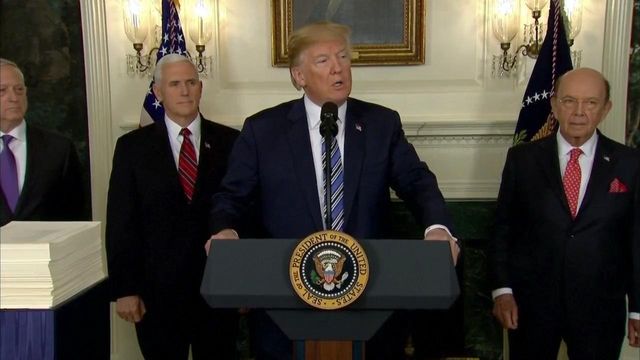Trump signs spending bill, reversing veto threat and avoiding government shutdown
WASHINGTON -- President Donald Trump signed a $1.3 trillion spending bill into law Friday, avoiding a government shutdown that had suddenly become a possibility when the president vented on Twitter about his frustration with the bipartisan legislation.
Posted — UpdatedThe president backed down from his threat to veto the spending bill in a head-spinning four hours at the White House that left both political parties in Washington reeling and his own aides bewildered about Trump’s contradictory actions.
Speaking at the White House, Trump placed his hand on a stack of budget documents and criticized what he called “this ridiculous situation” — but he said the spending plan was important because it increases money for the military.
“As a matter of national security I have signed this omnibus budget bill,” he said.
But early Friday, the president had tweeted his displeasure with the bill, citing Congress’ failure to fund his long-promised border wall.
“I am considering a VETO of the Omnibus Spending Bill based on the fact that the 800,000 plus DACA recipients have been totally abandoned by the Democrats (not even mentioned in Bill) and the BORDER WALL, which is desperately needed for our National Defense, is not fully funded,” Trump posted on Twitter in a message that imperiled a sweeping bipartisan agreement brokered by congressional leaders over his reservations.
He was referring partly to the fact that he failed to reach a deal with Democrats to include provisions in the spending measure that would preserve Deferred Action for Childhood Arrivals, or DACA, an Obama-era program he rescinded last fall that allows unauthorized immigrants brought to the United States as children to apply for permits to work legally and avoid deportation.
But the president was most angry about the lack of funding in the bill for a massive wall on the nation’s southern border that he has billed as the centerpiece of his crackdown on unauthorized immigrants. The measure includes nearly $1.6 billion for border security — including new technology and repairs to existing barriers — but not Trump’s wall, as he claimed on Twitter on Wednesday. It provides $641 million for about 33 miles of fencing, but prohibits building a concrete structure or other prototypes the president has considered, and allocates the rest of the funding for new aircraft, sensors and surveillance technology.
It was the latest instance of the president parting ways with his advisers in a sudden reversal that could have serious consequences. The measure cleared Congress early Friday and, while Trump had made plain he was unhappy with some aspects of it, his senior advisers spent Thursday telling reporters that the president would sign it.
A veto would have almost certainly shut down the government at midnight, just as hundreds of thousands of teenagers and adults are slated to descend on Washington for a gun control march. With Congress on spring recess for two weeks starting Monday, many lawmakers had already departed Washington early Friday. Some were on their way out of the country as part of official congressional delegations overseas.
Beyond the practical risks, the optics of the last-minute presidential outburst held peril for Trump. Unlike recent government shutdowns that stemmed from Congress’ inability to pass spending bills, this one would be precipitated by the president alone. In 1995 and 1996, vetoes of spending bills by President Bill Clinton shuttered the government temporarily, but in those cases, Clinton had the support of his party’s leaders in Congress, who objected to deep cuts to Medicare and conservative policy changes inserted into the spending bills.
If Trump were to have rejected the new spending bill, he would have defied Republican and Democratic leaders alike.
The president’s apparent change of heart came as a surprise but hardly a shock to Republican leaders, who spent much of a snowy Wednesday privately imploring an agitated Trump to put aside his objections and back the measure, claiming it as a win.
That proved difficult for the president, and not only because of the dearth of wall funding. The measure itself dealt a broad rebuke to his vision for reordering the size and scope of government, rebuffing his efforts to gut many domestic programs even as it provided the sizable military spending increase that Trump wanted.
Sensing a political advantage, Democrats were unperturbed by the tweet. Top Democratic aides said Friday morning that they would not make concessions to Trump if he chose to veto the bill.
Over the weekend, the White House offered to extend protections for hundreds of thousands of current DACA recipients for 2 1/2 years, with no guarantee beyond that time, in exchange for $25 billion for the border wall, according to congressional aides.
Democrats countered by saying they would agree to the full $25 billion only if the president agreed to a pathway to citizenship for a much broader population of young immigrants brought to the country illegally as children, well over 1 million people — a deal that was similar to an earlier offer from Trump.
The White House rejected the Democratic offer.
Related Topics
Copyright 2024 New York Times News Service. All rights reserved.





